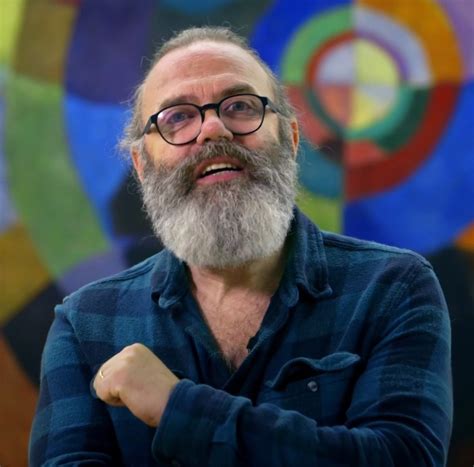Ein Zitat von Matthew Collings
Kunst verfügt über Wissen und Fähigkeiten, und sie kennenzulernen bedeutet implizit, gegen eine Kultur zu sein, die gegen Wissen ist – die heutige Massenkultur, die darauf abzielt, viele konsumfreudige Idioten hervorzubringen.
Themen zitieren
Verwandte Zitate
Die Wissensproduktion in den Schulen ist heute instrumentell, an objektive Ergebnisse gebunden, privatisiert und weitgehend auf die Produktion verbrauchender Themen ausgerichtet. Die Organisationsstrukturen, die dieses Wissen ermöglichen, verursachen erhebliche Kosten für jede tragfähige Idee von kritischer Bildung und kritischer Pädagogik. Die Lehrkräfte sind unqualifiziert und weitgehend auf das Lehren für die Prüfung beschränkt, die Unternehmenskultur organisiert die Governance-Strukturen der Schule, Wissen wird als Ware betrachtet und Schüler werden reduktiv sowohl als Konsumenten als auch als Arbeiter behandelt.
Diese Erziehung hat uns zu einer Nation von Idioten gemacht; Wir waren Fremde unserer eigenen Kultur und Lageranhänger einer anderen Kultur, die sich von Überresten und Müll ernährten. . . Was ist mit unseren eigenen Wurzeln? . . . Ich bin gegen das System, die gesamte Methode und den Ansatz eines Bildungssystems, das uns zu Idioten macht, zu kulturellen Idioten, aber zu effizienten Angestellten für alle Ihre Geschäfts- und Verwaltungsbüros.
Die Menschheit ist heute in der Gegenwart der Menschheit nicht sicher. Der alte Kannibalismus ist einer anonymen Aktion gewichen, bei der sich der Mörder und der Getötete nicht kennen und bei der tatsächlich die Tatsache des Massensterbens dazu führt, dass das Massenmorden weniger verwerflich ist als der Tod eines einzelnen Individuums . Kurz gesagt, wir haben uns in jeder Hinsicht weiterentwickelt, mit Ausnahme unserer Fähigkeit, uns vor menschlicher Intelligenz zu schützen. Unser Wissen ist umfangreich, umfasst aber nicht die Funktionsweise des Friedens.
Eine Sache, die ich an Komikern auf der ganzen Welt sehr interessant fand, war ihr Wissen über Dinge, die außerhalb ihrer eigenen Kultur und Komfortzone liegen. Das ist in den Staaten nicht sehr verbreitet. Wir produzieren unsere eigene Soft Power, die Popkultur, aber wir versuchen selten, Informationen aus anderen Kulturen und Ländern aufzunehmen und zu lernen.
Ich glaube nicht, dass ich gegen die Latina-Kultur rebelliert habe. Ich habe gegen diejenigen rebelliert, die versuchen, mir warme Tortillas für meine Brüder zu machen, wenn sie sie selbst wärmen können. Ich habe gegen eine patriarchalische Religion rebelliert. Ich rebelliere auf jede erdenkliche Weise und in jeder Situation gegen Kleingeistigkeit, aber diese Dinge sind kein fester Bestandteil der Latina-Kultur und ich werde mich mit allen Mitteln gegen jeden wehren, der versucht, mir das Gefühl zu geben, ich sei weniger Xicana, weil ich die Kleinlichkeit nicht annehme. Gesinnung.
Viele Lehrer der Sechziger-Generation sagten: „Wir werden eure Kinder stehlen“, und das taten sie auch. Ein bedeutender Teil Amerikas ist zu den Ideen der 1960er Jahre konvertiert – Hedonismus, Maßlosigkeit und Konsumismus. Für die Hälfte aller Amerikaner ist die Woodstock-Kultur der Sechzigerjahre die Kultur, mit der sie aufgewachsen sind – ihre traditionelle Kultur. Für sie liegt die jüdisch-christliche Kultur mittlerweile außerhalb des Mainstreams. Die Gegenkultur ist zur dominanten Kultur geworden und die frühere Kultur zur Dissidentenkultur – etwas, das weit abseits und „extrem“ ist.
Die neokonservativen Kritiker der linken Kritiker der Massenkultur verspotten den Protest gegen Bach als Hintergrundmusik in der Küche, gegen Platon und Hegel, Shelley und Baudelaire, Marx und Freud in der Drogerie. Stattdessen bestehen sie auf der Anerkennung der Tatsache, dass die Klassiker das Mausoleum verlassen und wieder zum Leben erweckt wurden und dass die Menschen einfach viel gebildeter sind. Stimmt, aber wenn sie als Klassiker zum Leben erweckt werden, werden sie als etwas anderes als sie selbst zum Leben erweckt; sie sind ihrer antagonistischen Kraft beraubt, der Entfremdung, die die eigentliche Dimension ihrer Wahrheit ausmachte.
Eine Kultur, die ich der amerikanischen Kultur gegenüberstellen möchte, ist für mich faszinierend: die Kultur Deutschlands. Sie haben in ihrer Kunst, ihrer Poesie, ihrem öffentlichen Diskurs und ihrer Politik einen langen Prozess durchlaufen, in dem sie sich die Tatsache eingestehen, dass sie an den Ereignissen des Zweiten Weltkriegs beteiligt waren. In Deutschland ist es immer noch ein alltägliches Gesprächsthema.
Echte Künstler finden Antworten. Das Wissen des Handwerkers liegt im Rahmen seiner Fähigkeiten. Ich weiß zum Beispiel viel über Objektive, über den Schnittraum. Ich weiß, wozu die verschiedenen Tasten an der Kamera dienen. Ich weiß mehr oder weniger, wie man ein Mikrofon benutzt. Ich weiß das alles, aber das ist kein wirkliches Wissen. Echtes Wissen besteht darin, zu wissen, wie man lebt, warum wir leben und solche Dinge.
Ein ernstes Problem in Amerika ist die Kluft zwischen der akademischen Welt und den Massenmedien, die unsere Kultur ausmachen. Professoren der Geisteswissenschaften haben trotz all ihrer linken Fantasien kaum direkte Kenntnisse über das amerikanische Leben und keinerlei Einfluss auf die öffentliche Ordnung.
Was den Menschen fremd geworden ist, ist die menschliche Komponente der Kultur, ihr engster Teil, der sie gegen die Welt aufrechterhält. Sie machen mit der Welt gemeinsame Sache gegen sich selbst, und der entfremdetste Zustand von allen, die Allgegenwart der Waren, ihre eigene Verwandlung in Anhängsel der Maschinerie, ist für sie eine Fata Morgana der Nähe.


































